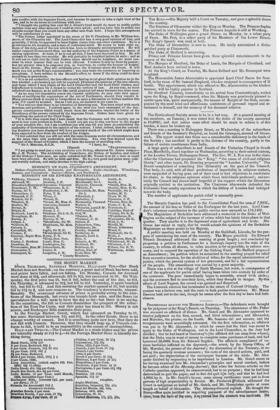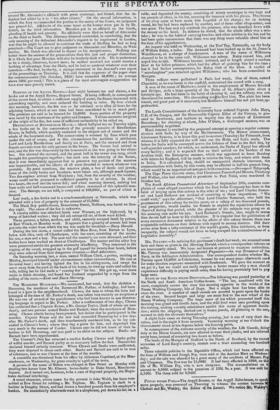PROCEEDINGS AGAINST THE MORNING J0URNAL...41e defendants were brought up for
judgment at the 'King's Bench, on Thursday. The attendance of Mr. Fisher was excused on affidavit of illness. Mr. Gutch and Mr. Alexander appeared to receive judgment on the first, second, and third informations ; and Alexander, and Marsden, the printer, on the fourth. Mr. Isaacson did not answer, and his recognizances were accordingly estreated. On the first information, an affidavit was put in by Mr. Alexander, in which he swore that the libel was meant to apply to the Duke of Wellington, not to the Lord Chancellor, as the Jury had decided ; that he had heard at Garraway's (the affidavit did not state from whom), that the Duke was in want of money to complete some purchases of land, and had borrowed 30,000/. from Sir Edward Sugden. The affidavit complained of various hardships inflicted on the deponent,—the arrest, by the Stamp Office, of Mr. Marsden, the printer of the Journal; the discourtesy of the Treasury, in refusing the quarterly revenue accounts ; the costs of the several actions, paid, and not paid ; the depreciation of the newspaper because of the trials. Mr. Alee ander finished by requesting to be imprisoned in London. Mr. Gutch swore to his having examined into Mr. Alexander's principles and moral conduct, before he became editor of the Morning Journal; that when the furious articles on the Catholic question appeared, he remonstrated, but to no purpose; that he had long determined to quit the paper, and in fact did quit it:in July, and that be had lost 4,0001. by it. In Mr. Gutch's favour, some strong certificates were put in from persons of high respectability in Bristol. Mr. Frederick !Pollock addressed the Court in mitigation on behalf of Mr. Gutch, and Mr. Humphries spoke at some length on behalf of Alexander. The Attorney-General replied. He thought the Stamp-office quite justified in requiling payment of the advertisement duties, since from the facts of the case, it appeared that the concern was insolvent, Ile ; _ . treated Mr. Alexander's affidavit with great contempt, and hinted, that the defendant had added by it to " his other crimes." On the second information, in which the Jury recommended the parties to the mercy of the Court, no judgment was prayed for. Affidas its of the same tenor as the former were put in by Mr. Gutch, on the third information. Marsden put in an affidavit on the fourth, pleading ill health and poverty. No affidavits were filed on behalf of Alexander on the third or fourth. The Attorney-General contended, in concluding, that the only meaning of the defendant Alexander's request to be imprisoned in London, was that he might be allowed to continue the trade of libelling he had so long practised.—The Court are to give judgment on Alexander and Marsden, on Wednesday. Mr. Gutch was allowed to depart on his recognizances. Nothing can better show the animus of the prosecutions than this just and proper distinction. It is likely that poor Marsden will also be tenderly dealt wIth. He is understood to be a steady, laborious, honest man; he neither received nor could receive a farthing of advantage from the libels, and he had no controul whatever over their insertion.—We find, by-the-by, a strange statement in the Journal's own report of the proceedings on Thursday. It is said that the expenses of the paper since the commencement (6th October, 1828) have exceeded 40,0001.; an average above 500/. per week! This is a piece of the most extravagant exaggeration we have ever seen gravely stated.



















 Previous page
Previous page